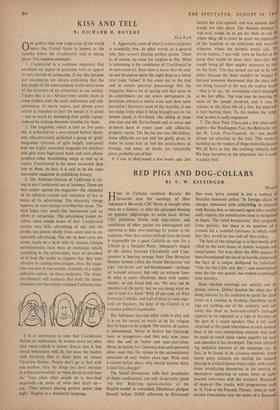KISS AND TELL
By RICHARD H. ROVERE New York
ONE gathers that over large areas of the world today the United States is known as the country where the Confidential trial is taking place. This requires comment: 1. Confidential is a scabrous magazine that combines an appeal to prurience with an appeal to envy-hatred of aristocrats. (I say this because our sociologists are always explaining that the big people in the entertainment world serve some of the functions of an aristocracy in our society.
I guess this is so.) Almost every article deals in some fashion with the erotic adventures and mis- adventures of movie actors, and almost every article is intended to hurt the people it is about —not so much by damaging their public reputa- tions as by making domestic troubles for them.
2. The magazine, which is four or five years.
old, is published by a man named Robert Harri- son, who previously published a group of 'girlie' magazines (pictures of girls largely undressed) and one highly successful magazine for fetishists (the girls wore high-laced boots and were photo- graphed either brandishing whips or tied up in ropes). Confidential is far more successful than any of these. In fact, it is said to be the most successful magazine in publishing history.
3. The Attorney-General of California is try- ing to put Confidential out of business. There are two counts against the magazine—the obscenity of its editorial content and violations of law in some of its advertising. The obscenity charge appears to raise certain civil-liberties issues. The trial looks very much like harassment and an effort at censorship. The advertising matter in- volves some simple issues of fact. Confidential carries very little advertising of any sort (its profits are almost wholly from sales) and no re- spectable advertising. The ads its does carry are pretty much on a level with its articles. Certain advertisements have been of medicines which, according to the prosecution, were so described as to lead the reader to suppose that they were effective in causing miscarriages. Also, the maga- zine ran one or two articles, evidently of a rather collusive nature, on these medicines. The Attor- ney-General will maintain that both the adver- tisements and the articles violated California law.
4. It is interesting to note that Confidential thrives on euphemism. Its writers never say what they mean (which is almost always that A had sexual intercourse with B), but tease the readers with locutions that at times have an almost Victorian flavour. People don't go to bed with one another; they 'do things you don't mention in polite conversation' or 'what the birds and bees do.' Very often what people do is described negatively—in terms of what they don't do- e.g., 'They weren't playing parlour games that night.' English is a wonderful language. 5. Apparently, most of what Confidential prints is essentially true. In other words, as a general rule, they weren't playing parlour games. There is, of course, no cause for surprise in this. What is interesting is the confidence of Confidential in its own material. How does it know that So-and- so and-So-and-so spent the night deep in a forest near Lake Tahoe? It has come out in the trial and in certain pre-trial proceedings that the magazine does a lot of spying and that some of its contributors are not above entrapment. (A prostitute attracts a movie actor and then turns journalist.) However, most of the material, if one can judge from what is being brought out on the witness stand, is first-hand—the telling of those who kiss and tell. Ex-husbands and ex-wives and ex-lovers have in many cases sold affidavits, properly sworn. The fee for one was 200 dollars. Some affidavits are not sold but gladly given, in order to cause hurt or feel the satisfactions of revenge, and some, no doubt, are reluctantly given, probably out of fear.
6. I was in Hollywood a few weeks ago, just before the trial opened, and was assured that n would not take place. The defence strategy, was said, would be to get the State to call the whole thing off in order to spare the reputations of the hundred or so celebrated and wayward witnesses whom the defence would call. 1-he movie studios, I was told, were so fearful of the harm that would be done their stars that they would bring all their mighty pressures to bear on the State. This has turned out not to be true either because the State couldn't be budged or because someone discovered that the stars were not being harmed in the way the studios feared —that is to say, the revelations aren't damaging at the box office. The trial may be scarring the souls of the people involved, and it may he ruinous to the home life of a few, but otherwise it isn't hurting them. To the studios the 'other- wise' is what is really important.
7. The New York Times and a few other news' papers—the Washington Post, the Baltimore SO the St. Louis Post-Dispatch, etc.—are paying almost no attention to the trial. This works hardship on the readers of thofe estimable papers. We all have to buy the morning tabloids noW- We hate ourselves in the afternoon, but it realli is a juicy trial.






























 Previous page
Previous page